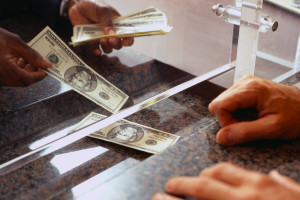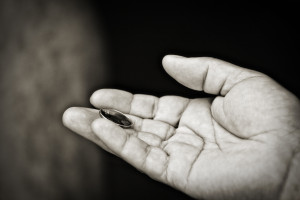On Saturdays, we went to the bank with dad.
The Regency Savings Bank of Geneva, IL welcomed its patrons with platters covered in white paper doilies, piled high with a variety of butter cookies. Dad would fill one of the provided styrofoam cups with coffee from the percolator.
We started coming with Dad when I was a toddler, an era when my memories blur one into the other. In those early days, my older sister and I waited at the Playschool picnic table, laid out with coloring books and crayons. At this point any of our collected coins got plopped into Piggy Banks on our dressers. Soon enough we started to trail Dad to the bank counter, to watch the magic.
The tellers counted the cash onto the counter like tarot cards, experts at slipping paper across paper. They moved through their tasks without looking: stamping, signing, unlocking, typing on the number pad on the computer, and printing receipts by feeding a machine with a small slip of paper that got pulled into the machine to be stamped with account balances.
At home, we imitated the movements of the tellers in elaborate games of pretend bank, using stacks of pocketed deposit slips and carbon copy return tickets from the local Venture department store. We idolized those women at the bank, second only to the grocery clerks at the supermarket who almost always had long acrylic nails that clicked across the keypad.
On Saturday mornings, the bank hummed with the financial business of the town locals. I came to recognize the tellers and the bankers in suits who sat at glass enclosed cubicles. When not serving a customer, they popped out of their offices to circulate around the premises and greet account holders by name. We usually got greeted by the tall, lady banker with the short black hair, who seemed to be having a perpetually good day since the late ‘80s.
At the tall desks in the lobby, my Dad endorsed his stack of checks, a lefty with the characteristic curve in of his hand. He always came with his own blue, ballpoint pen since the ones chained to the desk had long run out of ink. Each week, my dad left the bank with a thin white envelope full of twenties that he placed up in the cabinet next to the fridge, so Mom could select a crisp bill or two and take them to the grocery store.
The tall smiley banker told my Dad that we could open our very own savings accounts, and Carolyn and I were each entrusted with a small grey book, monogrammed with the maroon initials of the bank. These very important books were housed in the roll top desk in the kitchen and kept in protective plastic sleeves. We covered the plastic sleeves with stickers received from the teller for each deposit we made at the bank.
Each visit to the bank corresponded with a new entry in our passbooks. We took a portion of our newly implemented weekly allowance which we had sorted into styrofoam cups marked “savings,” “spending,” and “church.”
I imagine I had some sort of coin purse or hand me down wallet, but I mostly remember holding the coins in my fists till they grew warm and sweaty against my palms. When we handed over our coins and deposit slip, the teller put the coins into a coin sorter, taking my precious book to feed into a machine that stamped the new balance of my account.
I tried to read over my account ledger with the seriousness the other patrons used as they carried out their banking. I followed the new entry line across the page with my finger to verify the deposit amount matched my handful of change. On birthdays and Christmas, we brought checks from our grandparents and carefully determined how much cash to take out and how much to entrust to the bank, which was very grownup business.
After the bank, we ran a few other customary errands to the local Ace Hardware store and to Sally’s Sub House or McDonalds, where I couldn’t help but make the connection that the money dad got at the bank bought Happy Meals and packs of grape Bubblicious gum.
I watched my parents do things with cash, taking it out of envelopes and carefully counting their pennies. I looked on as my mom put items back at the grocery store to match the amount of bills in her wallet. Both my parents were visible stewards of our money, physically placing it into the hands of others or the golden offering plate to save, spend, and give.
The Regency Savings Bank has long been bought up by other bank chains, changing names and buildings and cookie brands. Now our money zooms through cyberspace, teleporting from one account to another. We no longer have to tabulate our finances and I-owe-yous with paper and pen, but pay instantly from the latest app on our phones. Store clerks ask us if we want that useless piece of non-recyclable paper called a receipt, and we wave them off while only a few people still carefully pen their transactions into their checkbook.
But I think I miss touching money, holding it in my hands, and seeing that it is paper and metal. Perhaps I will start to go to the bank again on Saturdays and take out an envelope of crisp bills to bestow with care as my parents did.
***


